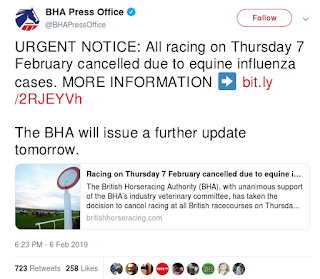#13,842
Overnight (see tweet above) the British Horseracing Authority (BHA) cancelled all racing and horse events due to the detection of 3 cases of equine influenza in previously vaccinated horses (see BBC Report)
According to the update (see below), further test results will be available later today.Equine influenza (H3N2 for the past 50 years), while not generally considered to be a zoonotic disease, has jumped species (to dogs in 2004), and has been shown experimentally able to infect pigs (see J.Virol.: Experimental Infectivity Of H3N8 In Swine).
In 2016, in Epizootics, Host Ranges, and Conventional Wisdom we looked at the history of equine epizootics - including the panzootic of 1872 - and at a study (see A Review of Evidence that Equine Influenza Viruses Are Zoonotic) that argued that human EIV infections occasionally occur.All influenza viruses evolve - and their threat profile and current vaccine effectiveness can change over time (see Equine H3N8: Looking At A long-shot In The Pandemic Sweepstakes) - but for now the biggest concern over Equine H3N8 is the toll it can take on horses and the local economy.
Today's update from the BHA follows:
BHA update regarding equine influenza case
07 Feb 2019 BHA
Racing was shut down today as a precautionary measure to restrict the movement of thoroughbred race horses and prevent any further spread of the virus. This is a standard contingency in the event of an infectious disease affecting our horses. It was essential that racing be stood down today and controls on movements of horses be put in place in order to attempt to control the spread of the disease, and the decision was taken swiftly last night that this course of action should be taken, once the extent of the issue was known. The BHA consulted with its veterinary committee before making this decision.
We will endeavour to issue regular information but we are still in the early stages of assessing the scale and severity of the outbreak. We are working quickly to identify the extent of the infection and will have more information when further test results are returned today. The results from those tests will not be known until this evening. Following these results being known a call will be convened to discuss the implications and a decision will then be made as to the impact on racing in the coming days.
We are aware that people want to know the situation as regards racing tomorrow and this weekend and we will seek to provide more clarity as soon as we are able. It is likely that any definitive decisions on whether racing can take place tomorrow will be taken later this evening.
We are contacting trainers of all yards which might conceivably have had contact with horses from the affected yard in order to advise them on biosecurity measures and to ask them not to move horses. We are also issuing guidance to the wider population of trainers. We are working closely with the National Trainers Federation to share this information and ensure that trainers are kept as informed as possible. Trainers are being sent a contact number should they have further questions, and they are advised to contact their vets with any further concerns.
Anyone visiting a racing yard should exercise appropriate caution and check with a trainer before visiting, and trainers are advised to limit where possible the movement of people to and from their yard. There is a Code of Practice for dealing with infectious diseases on the website of the National Trainers Federation.
All British race horses are vaccinated against equine influenza. However this strain has affected vaccinated horses. The disease may be serious in unvaccinated horses, although symptoms in vaccinated horses are usually mild and transient. Symptoms may include a raised temperature, a cough and nasal discharge. It is highly contagious. Humans are not at risk from the virus though can be transmitters of the virus.
The situation here is not the same as the incident in Australia in 2007. Australian thoroughbreds are not vaccinated against influenza, while British thoroughbreds are, as the virus is endemic in the UK. Therefore an important barrier is in place to prevent the same situation occurring here. However, as we have seen in Europe, the virus has affected vaccinated horses in this case. The vaccine should however help reduce to a certain extent the effect and spread of the disease in thoroughbreds.
This is a wider horse health issue which is not confined to horseracing. Unlike thoroughbreds in Britain, it is not compulsory for the wider horse population to be vaccinated against equine flu. Whilst the BHA is not specifically responsible for non-race-horses, the general advice to owners would be to contact your vet if you have concerns.
